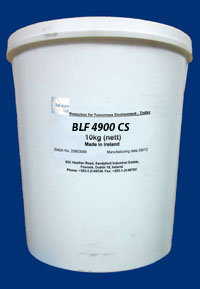// Business Scope » MUNICIPAL|BFL 4900CS

BFL 4900CS
MUNICIPAL|BFL 4900CS
BFL 4900CS-REMOVAL HYDROCARBON COMPOUND, HIGH BOD/COD AND TOXICITY OF NITRIFIERS IN WASTEWATER FROM PHARMACEUTICALS, PETROCHEMICALS, INDUSTRIAL CHEMICALS.
Outstanding advantages of the product:
* Application of municipal wastewater.
* Efficient degradation of a wide range of organic chemicals like phenols, solvents, amines, aromatics, aliphatic hydrocarbons, pharmaceutical intermediates, etc. in municipal plants.
* Aerobic degradation of chemicals and solvents in aerobic wastewater treatment systems.
BFL 4900CS can be used in conjunction with BFL 4000 series products for multi-problems treatment at the same time for a specific application (once-through solutions) in a system depending on the nature of the wastewater being produced. Remember the rule of Golden ratios of BFL products.
* Microbes work under aerobic conditions and as facultative anaerobes.
Municipal treatment plants that receive effluent from chemical plants have to handle a very wide range of chemical compounds. These organic chemicals will be alien to the biomass used to treat domestic sewage and are therefore difficult to degrade efficiently.
Some of the industries that produce the wide range of organic chemicals requiring treatment include :-
* Pharmaceuticals
* Solvent production
* Agrochemicals
* Petrochemicals
* Polymers
* Tanneries
* Paints
* Textile
Since there is such a wide diversity of industries and of compounds present in these wastewaters it is important to have a microbial product with a wide range of strains capable of dealing with the problem. Such a product is BFL 4900CS.
The situations in which the use of BFL 4900CS is beneficial include:-
* Plant start up
* Poor settlement
* Overloaded plants
* Poor BOD/COD removal
* Removal of toxicity to nitrification
* Shock recovery
BioFuture harnesses the power of environmental biotechnology to deal with the problems in the treatment of effluent from the chemical industry. This is achieved by the use of products such as BFL 4900CS that contain a range of specialised microbes with the ability to efficiently degrade a broad range of organic chemicals in addition to the degradation of sewage components.
What is BFL 4900CS?
BFL 4900CS is composed of a carefully selected blend of natural micro-organisms that have the ability to efficiently degrade a wide range of organic chemicals in municipal plants. These include phenols, solvents, amines, aromatics, aliphatic hydrocarbons, pharmaceutical intermediates, etc. The use of a wide range of strains ensures that the range of organic chemicals found in many effluents can be effectively degraded. The strains chosen for the formulation can produce the complete range of enzymes required for degradation of complex chemicals.
These strains grow at a fast rate so that they can quickly establish dominance in the biomass, which is the heart of the wastewater treatment system.
The product contains strains that have the ability to produce good floc structure. This helps to produce a biomass that will settle well and produce a clear final effluent.
Since many chemicals can prove to be toxic to the micro-organisms that are responsible for nitrification it is important to efficiently degrade these compounds so that toxicity to nitrifiers is reduced. The cultures in BFL 4900CS can provide this function. This is a key benefit from using this product since nitrification can be slow to restore once it is lost.
The strains in the product have been isolated from the natural environment so they work in harmony with the existing biomass and increase its overall efficiency so that plant performance is restored as quickly as possible.
The type of systems in which BFL 4900CS can be used include:-
* Activated sludge
* Biotowers
* MBBR
* Oxidation ditches
* SBR’s
* Aerated lagoons
* MBR
* Trickling filters
The microbial strains are produced as single pure cultures, harvested, stabilised on a cereal base and blended together to produce the final product. Extensive checks are conducted throughout the process to ensure purity and quality of the product.
Directions for use
The product as supplied is on a cereal base so it is important that the bacteria are rehydrated before use. This is achieved by adding the required quantity of product to lukewarm (~30oC) water in a suitable container. Apply 1 part product to 10 parts water, stir well and allow to stand for 30 minutes to 1 hour before application.
Apply the rehydrated product immediately prior to the aerated section of the treatment plant e.g. into a drain, pump sump or return sludge line.
BFL 4900CS can be used in conjunction with BFL 4000 series products for multi-problems treatment at the same time for a specific application (once-through solutions) in a system depending on the nature of the wastewater being produced. Remember the rule of Golden ratios of BFL products.
Since each application is different and has different characteristics it is important to assess the site before deciding on a dosing programme. The BioFuture Technical Department provides assistance in assessing the site and devising a treatment programme.
Product safety
The micro-organisms in BFL 4900CS have all been isolated from natural environments. They have not been genetically modified in any way. These microbial strains have been classified as being harmless to humans, animals and plants. The product is subjected to independent testing to ensure that it is free of Salmonella and other contaminants.
Product Characteristics:
* Dry preparation containing harmless natural bacteria stabilised on a cereal base.
* Temperature for the growth rate: 5 – 45 C degree
* Bacterial type: Natural microbes which have not been genetically modified and which belong to Group 1 as defined by WHO and EU.
* Salmonella/Shigella: Not detected.
* Appearance: Free flowing tan powder.
* Storage temperature: 0—45oC.
* Shelf life: 2 years.
Performance characteristics:
* Strong enzyme production for the aerobic degradation of chemicals and solvents in aerobic wastewater treatment systems.
* Microbes work under aerobic conditions and as facultative anaerobes.
* pH range: 5.0—9.0.
* Manufactured: Ireland, EU
* Available packaging: 5, 10 and 20kg buckets





